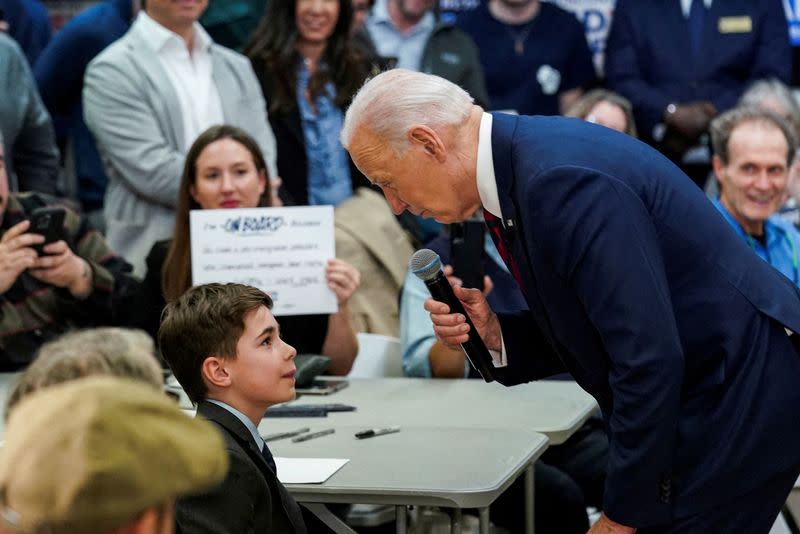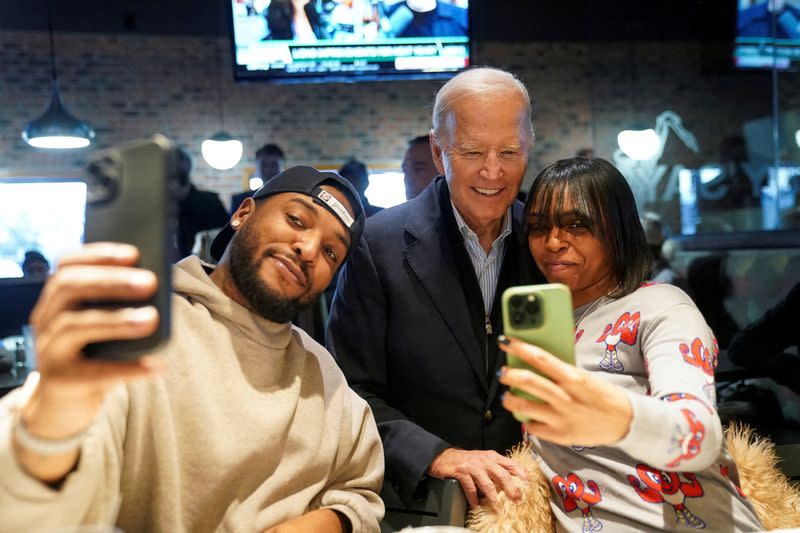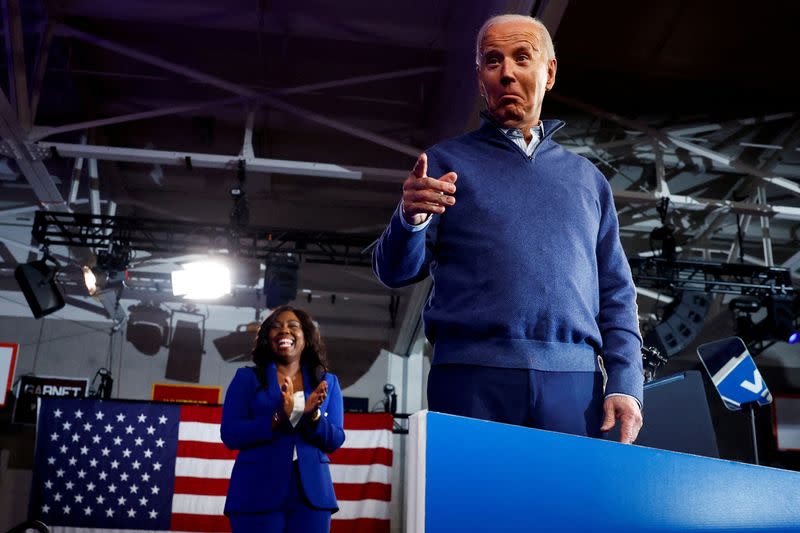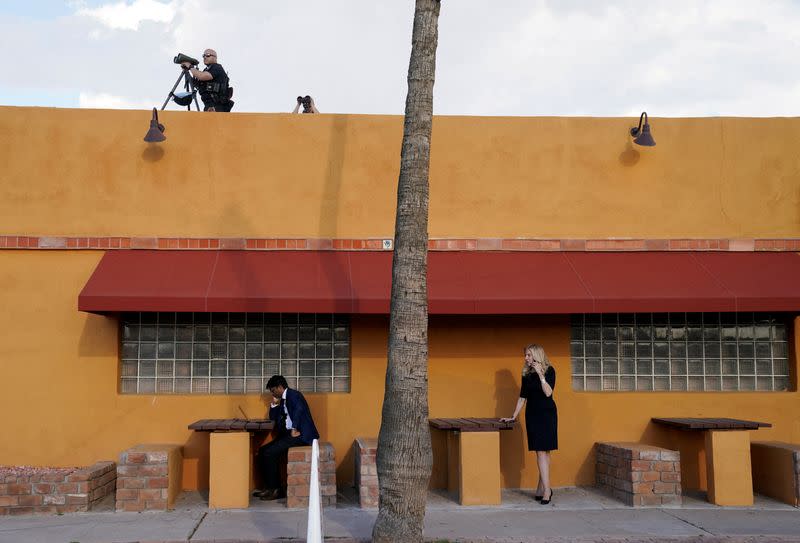More handshakes, fewer rallies as Biden 2024 campaign takes shape
- Oops!Something went wrong.Please try again later.
- Oops!Something went wrong.Please try again later.
- Oops!Something went wrong.Please try again later.
By Andrea Shalal
WASHINGTON (Reuters) - U.S. President Joe Biden is criss-crossing the country as his reelection campaign kicks into high gear, skipping big, loud rallies favored by his rival Donald Trump in favor of shaking hands at union halls, churches and restaurants.
It is an unusual approach that plays to Biden's strengths amid an increasingly fragmented U.S. media landscape, allies and many analysts say. Biden interacts with smaller groups, limiting highly-scrutinized teleprompter assisted events that sometimes lead to gaffes, while keeping at bay protesters angry about his handling of the Israel-Gaza war.
Biden's meetings with ordinary Americans are being turned into polished campaign videos and first-person TikTok posts viewed by millions, that often draw sharp contrasts with Trump's interactions with the public.
Biden, no stranger to big audiences, won praise for his fiery State of the Union speech on March 7 and is gearing up for another large event on Thursday, a rally with former Presidents Bill Clinton and Barack Obama that is expected to draw 6,000.
He has visited nine states since the March 7 speech, including battlegrounds Nevada and Arizona last week and Michigan and Wisconsin the week before. Most of the time, he has spoken to crowds of 100 people or fewer.
The campaign is betting its patchwork approach, of pricey targeted ads, small events that generate local media coverage, radio spots and surrogate appearances - all amplified by social media will help galvanize Democrats and independents needed to re-elect Biden.
"Biden has never been Cicero and never will be," said Larry Sabato, who heads the University of Virginia's Center for Politics, referring to the Roman statesman known for his oratory skills. He "depends more on what he has done and is doing to reach his supporters," he said.
Campaign officials see the dawn of a post-COVID era of campaigning, but David Barker, a professor at American University in Washington, isn't so sure. "If Obama were the candidate, you’d see a lot of big rallies."
Barker said relying on digital media to pull in the crowds could exclude some older voters who don't use social media and rely more on TV broadcasts. But he said the pool of persuadable voters was small - not more than 5-7% of voters - fewer than half of them could be influenced by media coverage anyway.
EVERY BATTLEGROUND STATE
With a slim 1 percentage point lead in the latest Reuters/Ipsos poll of registered voters, Biden needs to highlight stark differences with Trump, strategists and donors say, and build enthusiasm among the fractious coalition of Black voters, suburban women and Latinos that got him elected in 2020.
Biden didn't hold big rallies in 2020 either because of COVID-19, while Trump hosted events with thousands of attendees.
Republicans mocked him for campaigning from his "basement," but Biden won the popular vote by seven million and every battleground state, most by a very thin margin.
Campaign staff say they learned then that Biden could hop on a Zoom call with 5,000 supporters and still have a big impact.
Small events with carefully vetted participants also allow the campaign to avoid protests that have haunted Biden for months over his support of Israel's assault on Gaza that has killed more than 32,000 and now threatens famine. Israel is reacting to the Oct. 7 attacks by Hamas that killed 1,200.
In November a rabbi interrupted Biden at a fundraiser in Minnesota, urging him to call for a "ceasefire right now." In January, a Biden event in Virginia was repeatedly interrupted by shouts of "Ceasefire now" and "Genocide Joe."
In Dallas this month, protesters blew whistles and chanted “free Palestine” starting at 5:00 a.m., rousing hotel guests where Biden was staying. In North Caroline on Tuesday, they interrupted his remarks.
Campaign officials insist the protests are not dictating strategy, but the White House has stopped providing exact locations until just before Biden's events, making it difficult for demonstrators to assemble big crowds.
ADVICE ON A STUTTER
Online, Biden's campaign is focused on posts that highlight him displaying empathy, doling out advice and sharing fast food meals with families.
A video of his meeting with nine-year-old Harry Abramson, a boy with a stutter who had asked Biden how he overcame his own, has been viewed 1.2 million times on TikTok and generated over 280,000 likes on Instagram.
"He has that human connection with people and that’s different from Trump’s mega rallies and giant, roaring, menacing chants," said Wisconsin Democratic Party chief Ben Wikler.
Trump's incendiary rhetoric helps him dominate the news cycle, experts say, like a March 16 stop outside Dayton, Ohio, where he warned of a "bloodbath" if he loses in November.
The supporters who attend his rallies reflect the Republican Party's transformation in recent years: many are working-class voters who say they are in lockstep with Trump on issues ranging from immigration to trade and foreign policy.
Trump focused heavily on early nominating states until he secured his party's nomination, hosting rallies attended by hundreds or thousands of supporters. In early April, he is due to hold a rally in Wisconsin, a key battleground state.
Trump press secretary Karoline Leavitt said Trump was greeted by "crowds of enthusiastic Americans everywhere he goes."
(Reporting by Andrea Shalal; additional reporting by Jeff Mason and Nathan Layne; Editing by Heather Timmons and Daniel Wallis)




